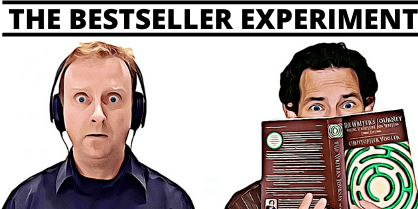EP03: Million-Selling Indie Author | Shannon Mayer

From farrier to million-selling indie author, USA Today bestseller, and writing machine, Shannon bestows wisdom, inspiration, and a quote that we want on t-shirts and bumper stickers.
PODCAST
Click to Tweet: @TheShannonMayer Your muse is your bitch! You have to make it work for you #amwriting @bestsellerxp
Thanks for listening and joining us. Have some feedback you’d like to share? Leave a note in the comment section below.
SPREAD THE LOVE
If you enjoyed this episode, please share it using the social media buttons you see at the bottom of the post.
SUBSCRIBE, RATE & REVIEW ON ITUNES
Please do subscribe on iTunes and leave an honest review for The Bestseller Experiment Podcast on iTunes. Ratings and reviews are extremely helpful and greatly appreciated! They do matter in the rankings of the show, and we read each and every one of them. Don’t forget, when subscribing to the show on iTunes you will get automatic updates.
If you have any questions, you can contact us here.
Episode Highlights:
- Shannon Mayer: Website | Facebook | Twitter | Mailing List
- How to earn a living from writing: It can be done, and Shannon shows you how. Spoiler: it involves a lot of hard work!
- Agents: So you need one?
- Training: Train yourself to learn your craft and how the industry works.
- Develop a work ethic: This is not a hobby and you’ll need to work around the day job.
- Your muse is your bitch! Don’t wait for creativity to show up.
- Editors: You need one. Yes, you do. And Shannon tells you where to find one.
- Scrivener – Software for Writing
- Co-Hosts:
Books Mentioned
- Venon & Vanilla – Shannon Mayer
- The Writer’s Journey – Christopher Vogler
- Fifty Shade of Grey
Links featured in today’s show:
- Bestseller Experiment’s Vault of Gold. Sign up to get your free Writer’s ebook
- Question Mark: Have a question you want answered on the show? Click here.
EPISODE TRANSCRIPT (HIGHLIGHTS)
Shannon started her working life as a farrier, but she had always longed to be a writer. For twelve years now she has been building a career as an incredibly successful indie author. She’a a USA Today bestselling author, and she’s written between 25-40 books (even she can’t recall exactly how many!), which have sold over one and a half millions copies, and she’s recently signed a deal with Amazon Publishing. You can find her online at ShannonMayer.com or @TheShannonMayer
Earning a living:
I was told by very well-meaning people — my family and friends — that you can’t make a living from writing books, it’s something you did as a hobby. The only people who made money were Stephen King or Anne Rice, the big names. And so I never took it seriously, until I was a few years into my horse-shoeing and my husband and I were discussing families and having children and how very difficult it would be to nine months pregnant and trying to crawl underneath a horse and change horseshoes. So we discussed options for another form of income. Being a typical family we couldn’t survive on a single income, so he really encouraged me, he said you’ve always loved writing, so why not try? The worst thing that’s going to happen is you don’t make any money out of it, but the possibility is there that you could have a small source of income that could cover what you’re already making. That was a few years ago — I was twenty-five — and I started then to write with the thought that I’m going to try and get something published and get my toes into that industry… A lot of authors don’t ever take that step. It’s too fearful to put yourself out there without someone you really trust backing you.
Agents:
I spent a lot of time in the traditional (publishing) world trying to get agents. I’ve had a couple of agents, and I’ve fired them both for various reasons. And I’ve had lots of interest recently from the traditional world, but it’s because they’ve seen my success and so I can be a little pickier now. I spent a lot of time learning about the industry and about agents and publishing houses and editors and the process and writing pitches and queries and that sort of thing, and it was all a really great education. Long story short, it’s been about three and half years now that I’ve been writing full-time and it’s been a fantastic journey. It’s hard, and definitely has its ups and downs, but I wouldn’t trade it for anything.
Making the most of quiet time:
When I had a little hour here and there to myself I was always writing down ideas. Like a lot of authors and writers out there I had probably ten or fifteen books that I’d started — two or three chapters of each — just running off inspiration I’d had in that moment, but I’d never gone forward with it and completed any of them. I think the most I’d have done was maybe thirty-five, forty thousand words of a single book, then another idea would crop up and because I didn’t have a goal specifically to publish. An idea would catch my attention and I would wander off to that and I think that’s a common issue with writers is that we have all these creative juices flowing, then as we get into a story a new idea crops up then we wander off. And that’s a good thing and a bad thing.
Training:
In terms of my own training I started attending writers’ conferences where I could learn from the masters — authors who already published and successful — and taking various courses, including university-grade editing courses, that ran over six-to-eight weeks, so I learned the back end of things, too. Understanding why people edit the way they edit actually helped me become a stronger writer because I could avoid the mistakes that a lot of writers make that the editors then have to fix. I looked for anything I could do to improve my craft and improve my understanding of the industry and improve my ability to market down the line, even though I didn’t have anything to market yet.
Write what you love:
I write in the urban fantasy genre, which I love. It’s a niche market, but that love comes through what I’m putting on paper, and I hear that back time and time and time again. And if I have a series that has twenty books in it (my readers) follow through the entire series.
Don’t try and write to market:
When Fifty Shades of Grey came out it was phenomenal worldwide hit for a variety of reasons and very quickly the books that followed that were exactly the same, and for a while they did okay, but now those authors have no following because they wrote to a market that had a limited run to it.
Develop a work ethic:
This is not just a hobby. My experience has been that a lot people say writing’s a hobby, something you do when you have time, or when you’re bored! When I was shoeing horses I would take my laptop with me and when I had a break between clients I would pull over to the side of the road and work for twenty minutes and then drive to my next stop and my lunch breaks I’d just wolf down my lunch and I would take my remaining forty minutes and I would write. I would get up at five o’clock in the morning, knowing I had to leave by seven and I would write. I took every opportunity I had to create a writing habit, to the point where now if I don’t write on a daily basis, I stress that I haven’t got my word count in or I haven’t worked enough to deserve success. It’s a very strange thing how that swings from something being driven that all of a sudden now it’s driving you. That work ethic is something that’s hard to develop and is a hard thing to explain to a lot of authors, because it’s such a creative job there is this feeling that I can’t write unless my creative juices are flowing, I can’t write unless my muse is speaking to me. And the reality is…
Your muse is your bitch!
… not the other way round. And you have to train it to show up to the party and the only way to do that is to sit down and regularly encourage it to come forward I still do have moments of burnout, and I might take a few days off, but that work ethic, that drive and pushing your creativity forward is the only way to make it happen.
If you wait for your creativity to show up you’re gonna be waiting a long time.
Don’t get sidetracked:
It’s easy to get sidetracked by Facebook and these sorts of things, especially when you’re published because you’re doing all the marketing and you’re saying to yourself this is part of the business and I have to do this too, which is accurate but turning that stuff off (is important).
I usually have some sort of classical or orchestral music in the background — because something with words is too distracting — and I can settle in within ten or fifteen minutes. Obviously some days are easier than others, but I still sit down.
Learn to touch type:
It definitely helps with the output. Keep at it. When I started I was lucky to get three or four hundred words an hour. I was very slow. Over time I’ve gotten better at it.
Like A Bump On A Log:
I always tell people, you can start now and work towards a goal and in a year you’ll be halfway there, but if you don’t do anything now, then a year from now that time still passes regardless of what you do with it, so you can either move forward or sit like a like a bump on a log. As long as you’re continually moving forward, you’re going in the right direction.
Outlining:
I used to be a ‘pantser’ (writing by the seat of your pants). I didn’t like the idea of being a plotter. I don’t know what my hang-up was about it, but I learned very quickly if I was going to write at the capacity that I wanted to, and produce a much as I wanted to, then I was going to have to learn to plot. I took a hold of ‘The Writer’s Journey’ by Christopher Vogler and now I write my plots out as detailed as I can and then send them to my editor, she has a look at them and pulls out any spots that she sees in terms of holes, or questions she would have or want answered, and then I make adjustments and then I dive in to the writing. That said, in the middle of books I will find myself veering off as a character misbehaves or whatnot.
Editors:
At this point in my career it’s pretty common for editors to come back with one or two points, usually just questions, wanting me to clarify that I understand as the author where I’m going with this. And they’re trusting me to do that. Maybe once a year now the editor will come back and say this is not up to snuff and maybe you should revisit this before you start writing. The nice thing about doing it that way is it cuts down the time in terms of editing and revisions and it cuts down their work because, hopefully, I’ve covered some of the issues that they would otherwise be picking up in their first and second passes. If you give them a plot outline that’s maybe three or four pages long, then it takes them twenty minutes to read through and take notes, or you’re giving them a book that’s seventy-five thousand words long, and it takes them a few days to read through… So you’re saving yourself time and money by giving them that (outline).
It’s probably been one of the best things I could have done, and I know it wouldn’t work for every author, but anytime I’ve been insecure about my writing I’ve leaned on my editors to help me find the holes in it. That’s their job, and I expect them to tell me when I’m writing crap.
There’s definitely ego involved when it comes to your own writing. You always want the editor to hear that this is the most amazing book I’ve ever written, it’s gonna get every prize out there, but the reality is they do you no favours by being kind. Kindness won’t make me a better writer, it won’t help you write a better book, it won’t help you get a better chance of a publishing deal if they are kind. You need them to be brutal and the only they’re going to do that is if you assure them that you’ll come back to them, and you will pay their fee… after you stop crying in the corner.
How to get an editor:
I met my very first editor on an editing course, she was training to be an editor, and I could tell that her style would match with what I was doing, so she worked with me for a few years. In the beginning you don’t know where to look, especially in my case I didn’t have a lot of author friends who were published, I didn’t have the network to go to that I have now. There’s a great site called Predators and Editors where you can look them up and see if an editor has been recommended. The other thing is to start creating that network of authors online and in conferences, these are great places to meet agents, editors and other authors and that’s going to be your support network.
Most People Choose To Eat:
The biggest hangup for most authors and writers is going to be that they have to put money out far in advance of ever seeing money come back, and that’s a hard thing for people to swallow. We’re all on a budget, we have to decide are we going to eat this month or are we going to pay our editor? And most people choose to eat, and that’s not a bad thing, but you see authors who have talent, they’re great writers, they have great storylines, they have terrible editing and terrible cover art and so they never break out, because they don’t have the help they need and they think that they’re going to make money without some sort of industry help to polish their gem. You don’t get a second chance at a first impression. Agents and editors of big publishing houses are watching bestseller lists, they’re looking for their next author, so think about when you’re looking for editors and cover art. You are going to make an impression one way or the other, and it could be good or it could be bad.
You can’t skimp on your editors and your cover art, it’s a very bad idea.
Shannon’s Top Tip:
Create that habit. The best thing you can do as a writer is create the habit to write every day. You cannot improve your work, you cannot have a shot at improving your work if you’re not working at it, so keep at it every day, even if you only give yourself half an hour, write. Write everyday.
Share the memes…
VIDEO TRAILER
SHARE THE PODCAST WITH A FRIEND
SUBSCRIBE TO THE BESTSELLER EXPERIMENT PODCAST!


